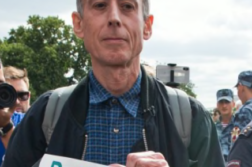PREVIOUSLY, I described my escape from Russia, via land and sailboat, to be with another woman in Canada (“Leaving Russia: A Personal Odyssey,” September-October 2009). My Canadian girlfriend Meg and I had been living together for two weeks in Kiev, Ukraine, when my parents, having followed me from Russia, physically attacked us for being gay. They made it clear that they would stop at nothing to keep me from Meg and return me to Russia for treatment in a mental hospital. Although we survived the assault and kidnapping attempt on March 1, 2006, and went into hiding in Ukraine, my parents continued to hunt us down. To survive, we ran. We made it to Turkey, bought a sailboat, and sailed to Canada.
On May 7, 2010, in Vancouver, British Columbia, a member of the Canadian Immigration and Refugee Board (IRB) declared me a refugee as defined by the unhrc’s Convention on Refugees. As a result, I was granted asylum in Canada as a “protected person.” I am now safe, and Meg and I don’t have to run any more.
When we landed in British Columbia, after battling the North Pacific in winter for 27 days, I was taken off our sailboat by Canadian Border Services officers to start the long process of filling out countless forms. Less than 24 hours earlier, I had been fighting for my life in ocean storms, and suddenly I was sitting in an office with lights, people, pictures on walls, plants, desks, and food.
As a refugee claimant I was given access to social services—health care, social insurance, a work permit—and help from non-governmental immigrant and refugee organizations. I was free to do anything a Canadian could do except leave Canada and vote—for now. Not knowing if I would be considered a refugee and allowed to stay in Canada made life uncertain. This uncertainty made finding work as an architect impossible, and with the great recession laying waste to the economy, even retail or dishwasher jobs were few and far between. We were in limbo, living day to day aboard the sailboat that brought us to Canada while waiting for a refugee hearing. When my lawyer sent the refugee claimant forms to the IRB, we were told to prepare for an eight-month wait.
Eight months came and went. I heard nothing. At one year, I was told there were a lot of Mexican and Czech refugees overloading the system, but that no case ever took more than eighteen months to process. Finally, almost three years after requesting asylum, I was informed that I had a hearing date. Meg and I were relieved. It began to look like our lives and future would be settled one way or another.”
Although legal aid had been provided when I arrived in Canada and claimed refugee status, it was denied when it came to the hearing. Meg and I couldn’t afford to pay my lawyer and found ourselves facing a life-or-death hearing without legal representation. I was desperate. If I couldn’t convince the judge I was really in danger in Russia, I could be sent back, right into the waiting hands of my parents and the police. Meg convinced me that we should be able to represent ourselves after all we’d been through. I hoped she was right.
The IRB hadn’t left us high and dry. In preparation for the hearing, they sent my ex-lawyer a “Screening Form” that covered the issues they would examine at the hearing. It indicated that Meg and I would have to prove my sexual orientation, my being persecuted for it, the lack of state protection or a safe place to run and hide within Russia, and how those issues related to the definition of a refugee. This last issue was stated with one word, “nexus,” sitting on its own under the heading “Convention Refugee Definition s.96.” At the time, we had no idea how important it would be.
From growing up in Russia and living through the collapse of the USSR, I knew that life was a challenge in the best of times; being a member of a sexual minority made life all the more difficult and dangerous. Most Russian gays and lesbians go to extraordinary lengths to hide their sexual orientation. Under relentless pressure, they date, marry, and have children in unloving and forced unions. Often their heterosexual partners have no idea they are gay or lesbian until the situation precipitates a crisis.
In Russia, my own family exerted huge pressure on me to marry a man and put an end to the whispered speculation that I may be “one of those women.” While gathering documentary proof of what gays and lesbians currently face in Russia, I was surprised to learn there are some who live openly. Whether this is by choice or by having been “outed” in an act of aggression, they face horrendous opposition and physical threat from a homophobic society indoctrinated at every level to be fearful and intolerant of sexual minorities. I was also surprised to learn that when my parents told the police that I was insane and needed to be committed to a mental hospital, it was no idle threat. Within Russia, standard medical practice dictates that any deviation from monogamous heterosexuality is a mental disorder subject to treatment. Reading countless reports of gays and lesbians forced by their families into psychiatric treatment, including electroshock, made me realize that I’m lucky not to have been one of them.
It seems to me that Russians are revealing an innate inability to love or feel compassion by so energetically hating and persecuting homosexuals. In news and raw footage I watched angry marchers bearing crosses and swastikas, government officials calling gays pedophiles, the mayor of Moscow condemning gay pride as satanic, and police and fascists openly beating gays in front of cameras for all the world to see. Amateur, professional, and news video have documented a terrifying phenomenon that seems to have come into being and grown in popularity since my escape: organized group outings to hunt down and attack gay men and lesbians. I watched well-organized church and skinhead groups taking to the streets, proudly explaining to the cameras that they were defending Russia from “pedo-sodomites.” One video shows a powerful and respected Orthodox priest narrating to the camera while his followers throng past in the background: “There are hundreds and thousands of young men gathering together in Russian towns and its capitol with only one purpose and desire—to find and beat up ‘unfinished faggots.’”
But can the Russian people be blamed? In 1991 Russians found themselves running headlong into capitalism and quickly forgetting the values of socialism. No one had a chance to take time and analyze the situation. Almost overnight, Russians found themselves a people with no past and an uncertain future. In such a precarious environment, with Russia losing its old ideological enemy and encountering economic hardship, finding an enemy within, provided Russians with a distraction from real problems and their leaders’ failure to address them.
Seeing us staggering under the mountain of documents and worried about our situation, an immigration consultant came to our aid. Having a lesbian daughter, she felt close to our case and volunteered to help us prepare without payment. Her help was invaluable. We learned that, while we had more than enough evidence to prove that Russia was an unsafe place for gays and lesbians, we hadn’t established a connection with those conditions and my personal safety. The consultant pointed out that we had to prove to the IRB judge (called a “member” in Canada) that there was no way that I personally would be safe if sent back to Russia. She noted that most homosexuals in Russia avoid persecution by zealously hiding their sexual orientation—an option that was not available to me now that the truth was out and my parents were actively hunting for me. In a way, I was lucky that they had physically attacked Meg and me. Their actions, triggered by me revealing that I’m a lesbian, put me in the immediate danger. I needed to prove that my country wouldn’t protect me.
It seems, being a member of a clearly targeted and persecuted social group is not enough to warrant refugee status. Being gay and Russian is not enough to prevent the denial of a refugee claim regardless of the common knowledge that gays and lesbians face grave danger in Russia at not only the hands of his/her society but police and other state actors. It is up to refugee claimants to prove not only that they are members of a persecuted social group but that they personally are under direct threat and can expect no protection from the state.
I didn’t set out to be a refugee when, more than four years ago, Meg and I chose to be a family, but I’m grateful to be given safety and freedom in Canada. In a way I’m glad that Meg and I were driven to risk everything without question to save our own lives, or I never would have witnessed the horrifying reality faced by GLBT people in Russia. Russian gays and lesbians are trying to live their lives. They hope, against all odds, that there will be a day when they will have the right to come out of the darkness into the light, and walk on Russian streets embracing and holding hands.
Elena Yovovich, born in Soviet Russia, was working as an architect when her life in Russia was interrupted by the events described in this article. Meg Adams is a writer and university lecturer based on Canada’s west coast, where she and Elena live aboard the 46-foot sailboat that carried them from Turkey.




